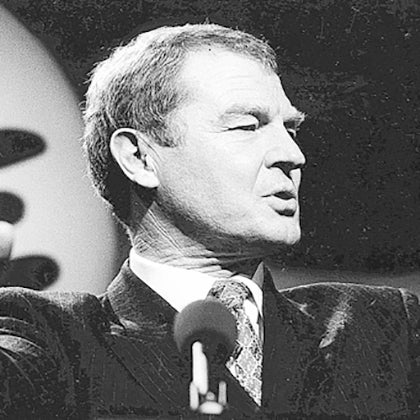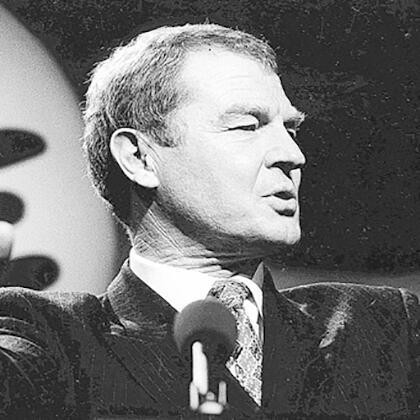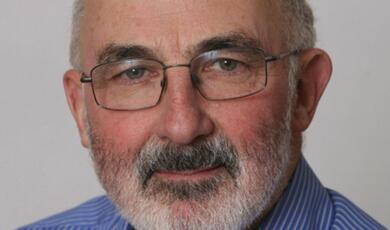After Iraq - Shall we ever intervene again?
Share
- Details
- Transcript
- Audio
- Downloads
- Extra Reading
The former leader of the Liberal Democrats, the Rt Hon Lord Ashdown KBE, recently stood down as the International Communities' High Representative in Bosnia and Herzegovina. During his time there, Lord Ashdown earned the respect of all parties.
Lord Ashdown is coming to Gresham as the guest of the Liberty Network of the Liberal Democrats, and the lecture will be followed by a drinks reception in the Courtyard. The Gresham lecture coincides with the publication of his new book 'Swords and Ploughshares: Building Peace in the 21st Century'.
Download Transcript
AFTER IRAQ: SHALL WE EVER INTERVENE AGAIN?
Lord Ashdown, KBE
It is time, to start thinking about what a post Iraq world might look like.
I think it very likely that we will see a bruised United States, turning in on itself and concentrating on homeland security, with some siren voices calling for a new isolationism and others looking for scapegoats for their pain and finding them amongst their closest friends, perhaps especially those in Europe, who, in US eyes did not come to the aid of their principal ally in its time of need.
Some say that Iraq has marked the apogee of US power. Maybe - though I think we would foolish to underestimate the dynamic effect of a new President in the White House, especially if that President happens to be a woman, or a black. Then America's entire image in the world could very easily be transformed.
What I think is unquestionably true, however, is that the world is going to be much more multi polar post Iraq than it was when the US was our only all dominating super power - and that could have a profound effect, especially on the whole issue of multilateralism versus unilateralism in international action.
Thirdly we will see an increasingly assertive Russia and China, both determined to move swiftly into every space left empty by a retrenching America.
Fourthly, this will present Western nations with a challenge - how do we respond to these events?
And the greatest challenge here will be to Europe which will, indeed has already begun to find itself facing the twin dangers of a withdrawing United States and an increasingly assertive Russia.
For the EU this will pose both dangers and opportunities.
The opportunity for Europe will be to play a larger independent role in world affairs - especially in the Middle East - to move carefully and sagaciously into those spaces the US leaves behind, rather than leaving them to Russia and to China.
The danger will come if Europe responds to US retrenchment, with a bout of mindless European anti-Americanism and a failure to realise that the days of taking a free ride for Europe's security on US military strength are over. It will require wise heads and strong wills to manage change in the Atlantic Alliance, whilst still maintaining its strength.
The right reaction from Europe to this new situation will be to strengthen its unity, deepens its institutions - especially those dealing with foreign affairs - and start to take tough choices about acquiring the instruments of hard defence. Monetary Union was the last platform for the European integration project. The sudden necessity for more integrated European foreign policy, post Iraq looks to me to be the next one.
The fourth consequence of the pain of burnt fingers in a post Iraq world is likely to be a determination never to intervene again.
Post-Iraq and Afghanistan, Western leaders will be less enthusiastic, their domestic populations less supportive, and the wider international community far less biddable in providing legitimacy for these adventures in the future.
That may be justifiable - even healthy - especially if it leads to a new understanding of the importance of multilateralism, rather than unilateralism in these affairs.
But it would be a tragedy if the response to pain in Iraq were to be, not 'How do we do it better?', but 'We must never do it again'.
If the consequences of bungling the peace in Iraq were to lead to an end to all attempts to promote good governance and the rule of law around the globe. Because we are going to need to intervene more, not less in an increasingly globalised and interdependent world.
The revelation of 9/11 still applies - our peace depends on the extent that we are willing and able to work together to prevent conflict or re-construct peace in other parts of the world.
We live in turbulent and instable times and, as the world moves deeper and deeper into the era of resource scarcity, global warming and massive shifts in the tectonic plates of power, this mix is only likely to get more potent and more dangerous.
At the present there are some 74 conflicts in progress around the world, the overwhelming majority of which have occurred inside states or between ethnicities. Some believe that what this tells us is that era inter state war is over - that these 'little' brush fire, intra state wars of recent years, are the only wars there will be in the future - and that the age of great wars is passed.
I am not one of those - partly because there is so much dry tinder lying around and far too many firebrands; partly because interstate competition, especially in the developing world is not diminishing, it is increasing. And partly because the best structures for fighting wars, the most powerful ideologies for driving wars and the most destructive weapons for using in wars, still remain in the hands of nation states.
But all major conflicts are preceded by a period of instability. Indeed one way to look at the world's present 'little' wars is that they are the 'pre-shocks' which always accompany major shifts in the established order. If we can control these better, by preventing them where we can, intervening more wisely where we have to and then reconstructing peace more successfully afterwards, we may make it easier to avoid a wider conflict.
Interventions are not now the exception, they are rather part of the blood stream of international affairs. Since the end of the cold war, the UN has, on average taken a decision to intervene in the domestic jurisdiction of one of its members, every six months. And despite the well known high profile failures, around 65% over of these have been successful in preventing a return to conflict. International intervention has cut the number of conflicts in the world in half since then end of the cold war and reduced war deaths by even more.
We should not allow ourselves to be blinded by the consequences of failed practise in Iraq and the difficulties of Afghanistan. For despite them this remains, overall, a safer world because we have been prepared to intervene where we had to and it will be a much more dangerous one if we cease to do this
What is more we do know how to do this, if only we could avoid, as in Iraq repeating what fails, when we should be replicating what succeeds. The Iraq experience - and to an extent that of Afghanistan too - represent the triumph of hubris, nemesis and above all and amnesia over common sense and past experience. In both of them we have, to a greater or lesser extent, abandoned past lessons in favour of a kind of nineteenth century 'gun boat' diplomacy approach to peace making. And it isn't working.
The things that have to be done to increase the chances of success - and things that should not be done because they can lead to failure - are not exactly rocket science.
And they are definitely not new - if only we could remember them long enough to apply them.
Avoid the conflict if you can - it will be much cheaper that way. But if conflict cannot be avoided, remember that it is not over when the fighting is finished. In fact the tricky bit is probably only then just beginning.
So, spend at least as much time and effort planning the peace as you do in preparing for the war that precedes it; make sure your plan is based on a proper knowledge of the country, especially its political dynamics, and leave your ideologies and prejudices at home. It is a mistake to try to fashion someone else's country in your own image; leave space for them to reconstruct the country they want, not the one you want for them.
Remember that you don't get a second chance to make a first impression; so don't lose the 'golden hour' after the fighting is over.
Dominate the security space from the start; then concentrate first on the rule of law;
make economic regeneration an early priority;
remember the importance of articulating an 'end state' which can win and maintain local support; but leave elections as late as you decently can.
When rebuilding institutions, be sensitive to local traditions and customs.
Understand the importance to the international community effort of co-ordination, cohesion and speaking with a single voice.
And then at the end, do not wait until everything is as it would be in your country, but leave when the peace is sustainable.
This new approach will require a new kind of national and international architecture to make it work. Cohesion here is the key. What is needed is a recognition that multilateralism is better than unilateralism. And an understanding that success can only come from a joined up cross agency approach which extends from the bottom to the top, is holistic in its application and views the continuum of peace making as a 'seamless garment' stretching from prevention, right through to the final exit of the interveners when a sustainable peace has been reconstructed. To be very blunt, I am not at all sure that creating small 'add-on bureaucracies' like Britain's Post Conflict Reconstruction Unit, the SCRS in the US and Canada's START is the right way to do this. I fear we will need something much more fundamental and interlocking if we are to do this right.
We also need a new way of thinking.
We have to stop viewing the exercise of foreign policy as a contact sport.
Our current policies for peace making are dominated by the projection of force, when what we should be doing is projecting influence, good governance and the rule of law.
We intervene as though democracy was our big idea. It is not. We are not even particularly good at it in our own countries Good governance is our big idea; the rule of law is our big idea; open systems and the market based economy - these are our big ideas. A stable democracy, fashioned to the conditions and the cultures of the country concerned, is what comes afterwards - it is the product, of good governance, not its precursor.
We seem to believe that nations and democracies can be built at the point of a bayonet, when they can only be built through institutions.
Reconstructing nations after conflict depends on the ability to win public support by winning the battle, not of armies, but of ideas.
The strength of Al Qaeda lies in its potency as an idea, not in its military strength.
If we are to win this battle, the language we use is going to be as important as the effectiveness of our military and security structures.
Our enemies are not 'Islamic terrorists', but terrorists who happen to be Muslims.
Our key friends are not our Western Allies, but that great majority in Islam who share our values and who need our help to win the struggle to prevent their religion being captured by these forces of darkness.
Our battlefield is not just the deserts of Iraq and the mountains of Afghanistan. It is also the multifarious and often invisible networks of global communications. Without access to satellite broadcasting, the internet and international media, Bin Laden is just a crazy in a cave. These viral structures are his battleground and we need to make them ours too.
We have to find a new way of thinking, if we are to reverse this and give ourselves a better chance of peace building in future.
To be successful, however, needs more than the right structures, good intentions and a warm desire to do something to help.
International intervention is a very blunt instrument, whose outcomes are not always predictable.
It is not for the faint hearted - or the easily bored.
It needs steely toughness and strategic patience in equal measure. And strategic patience needs strategic vision - and we seem to lack that too.
It also requires a willingness to commit a lot of troops at the start, a capacity to provide sustained international support to the end and an ability to endure a time frame that is measured in decades, not years.
And the only reward for success, if it can be achieved, is that all that expenditure and pain will be less than the cost and all that pain of the war that was avoided, or the price of chaos which would have ensued if the international community had stayed at home.
Meanwhile, leaving early, or doing it badly, may end up making things, not better, but worse - and nearly always means having to return later and do it again properly.
What this means is that intervention should not be undertaken lightly or because something must be done and no-one can think of anything better. It is important to remember the effect on the interveners, as well as on those subject to the intervention; intervening has a tendency to make the former arrogant and the latter, either angry or dependent - and often both.
The bad news is that, as Iraq and Afghanistan show, intervention is expensive and tough and difficult to do.
The good news is that, if we can learn to do it better, we will get our fingers burnt less - and in the process may make the world a much safer and less painful place than it is at present.
©Lord Ashdown KBE, Gresham College, 15 May 2007
This event was on Tue, 15 May 2007
Support Gresham
Gresham College has offered an outstanding education to the public free of charge for over 400 years. Today, Gresham plays an important role in fostering a love of learning and a greater understanding of ourselves and the world around us. Your donation will help to widen our reach and to broaden our audience, allowing more people to benefit from a high-quality education from some of the brightest minds.


 Login
Login






